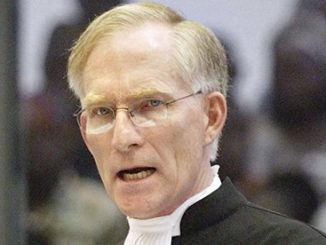Statement delivered by Deputy Foreign Minister Ebun Jusu during the general debate at the Second Committee of the UN
Mr. Chairman, Distinguished delegates :
At the outset, let me join previous speakers to congratulate you and members of the bureau on your election to steer the work of the Second Committee during the 66th session of the UN General Assembly and at the same time, thank your predecessor for her outstanding leadership leading to remarkable progress during the 65th session. You are assured of our full cooperation and support towards a successful conclusion of the business of this committee.
Sierra Leone aligns itself with the statement made by the distinguished representative of Kenya on behalf of the African Group, Argentina on behalf of G-77 and China and Nepal on behalf of the LDCs.
Mr. Chairman,
The Tenth meeting of the Conference of the Parties (COP 10) the United Nations Convention to Combat Desertification (UNCCD) to be held this month in Republic of Korea, 17th Conference of the Parties (COP 17th) to the United Nations Framework Convention on Climate Change (UNFCCC) to be held in South Africa later in the year and the Rio+20 Summit to be held mid-next year in Brazil will occur during this session. The importance of the work of this committee in providing the much-needed political momentum for these conferences cannot be over emphasized.
Mr. Chairman,
Sierra Leone is concerned about the seeming lack of political will and commitment for the implementation of internationally agreed development goals including the MDGs and the systematic attempt to renegotiate these commitments. In this regard, we urge the international committee for the urgent and full implementation of all the commitments particularly those contained in the United Nations Millennium Declaration, the Declaration on the New Partnership for Africa’s Development, the Monterrey Consensus of the International Conference on Financing for Development, the Plan of Implementation of the World Summit on Sustainable Development (Johannesburg Plan of Implementation) and the 2005 World Summit Outcome as well as the 2008 Political Declaration on Africa’s development needs.
Mr. Chairman,
The multiple and interrelated crises, particularly those of volatile energy and food prices, the adverse effects and impacts of climate change, the continuing impact of the recent global economic and financial crisis continue to undermine the development efforts of developing countries, especially LDCs, conflict and post conflict countries, majority of whom remain off track in achieving the MDGs by 2015.
In this regard, we emphasize the indispensable role that Official Development Assistance (ODA) plays in catalyzing economic and social development as well as poverty eradication and to that end, urge for the fulfillment of commitments to double the ODA by 2010 as agreed during the Gleneagles Summit of 2007 in a timely fashion. We reiterate that South-South cooperation is a complement to North-South cooperation rather than a substitute.
Mr. Chairman,
Strong and sustainable growth is critical for developing countries to meet the internationally agreed development goals. A strengthened United Nations framework for enhancing coordination and complementarities should be at the centre of efforts to bridge existing gaps, build consensus on efficient and effective solutions for global economic, social and environmental issues.
We remain committed to sustainable development and the eradication of poverty which is well articulated in our Agenda for Change aligned with the Joint Vision of the United Nations Country Team in Sierra Leone.
There is however, greater need to enhance efforts to mobilize adequate high-quality technical support, as well as to promote the development and dissemination of appropriate, affordable and environmentally friendly and sustainable technologies, and their transfers to developing countries on mutually agreed terms. In line with the Istanbul Programme of Action, we call for the implementation of targeted, predictable and sustainable productive capacity building programmes.
Mr. Chairman,
The effects and impacts of climate change are already evident in Africa and all over the world yet the level of commitment towards a global deal on emission reduction is still low. We must bear in mind that this negatively affects the extent to which poor countries can adapt as the cost becomes prohibitive. Adaptation needs essentially remain central to a global regime on climate change.
As presently evident in the horn of Africa, Desertification poses serious challenge to economic growth and efforts towards achieving the MDGs. Food prices have nearly tripled in some regions since last year, worsening the crisis. According to the United Nations University’s Institute for Natural Resources in Africa report if desertification is not given due attention and addressed, Africa may only be able to feed 25 percent of its population by 2025. This abundantly reflects the severity of the problem of drought and desertification and the imperative for action.
Clearly, there is a need to enhance the implementation of the UNCCD as a global policy and monitoring framework to address issues of soil and land degradation. There is therefore a growing need for the UNCCD to strengthen its preventive role not only in dry lands but also in other ecosystems.
We attach utmost importance to the Rio+20 Conference to be held next year in Rio de Janeiro and look forward to a successful and fruitful outcome, which we believe constitutes an important opportunity to reaffirm and renew political commitment to implement the previous engagement, in accordance with the Rio Declaration, Agenda 21, the Johannesburg Plan of Implementation and the relevant outcomes of the major conferences on sustainable development.
In conclusion, Mr. Chairman, let me add my voice to call on the developed countries to show flexibility and political will that is necessary to resolve the present impasse in the Doha Round of trade negotiations; and to take into account the urgent need for a rules –based, open, non discriminatory and equitable multilateral trading system that contributes to growth, sustainable development and employment. Additionally, we encourage all of our development partners to promote Foreign Direct Investment (FDI) which remains catalytic in augmenting domestic savings, employment generation, technology transfer and entrepreneurship in developing countries especially LDCs.
I thank you.
Leeroy Wilfred Kabs-Kanu
Minister Plenipotentiary
Permanent Mission of Sierra Leone to the UN
245 E 49th Street, New York, NY 10017
Tel: (212 ) 688 – 1656 Ext. 18





Leave a Reply